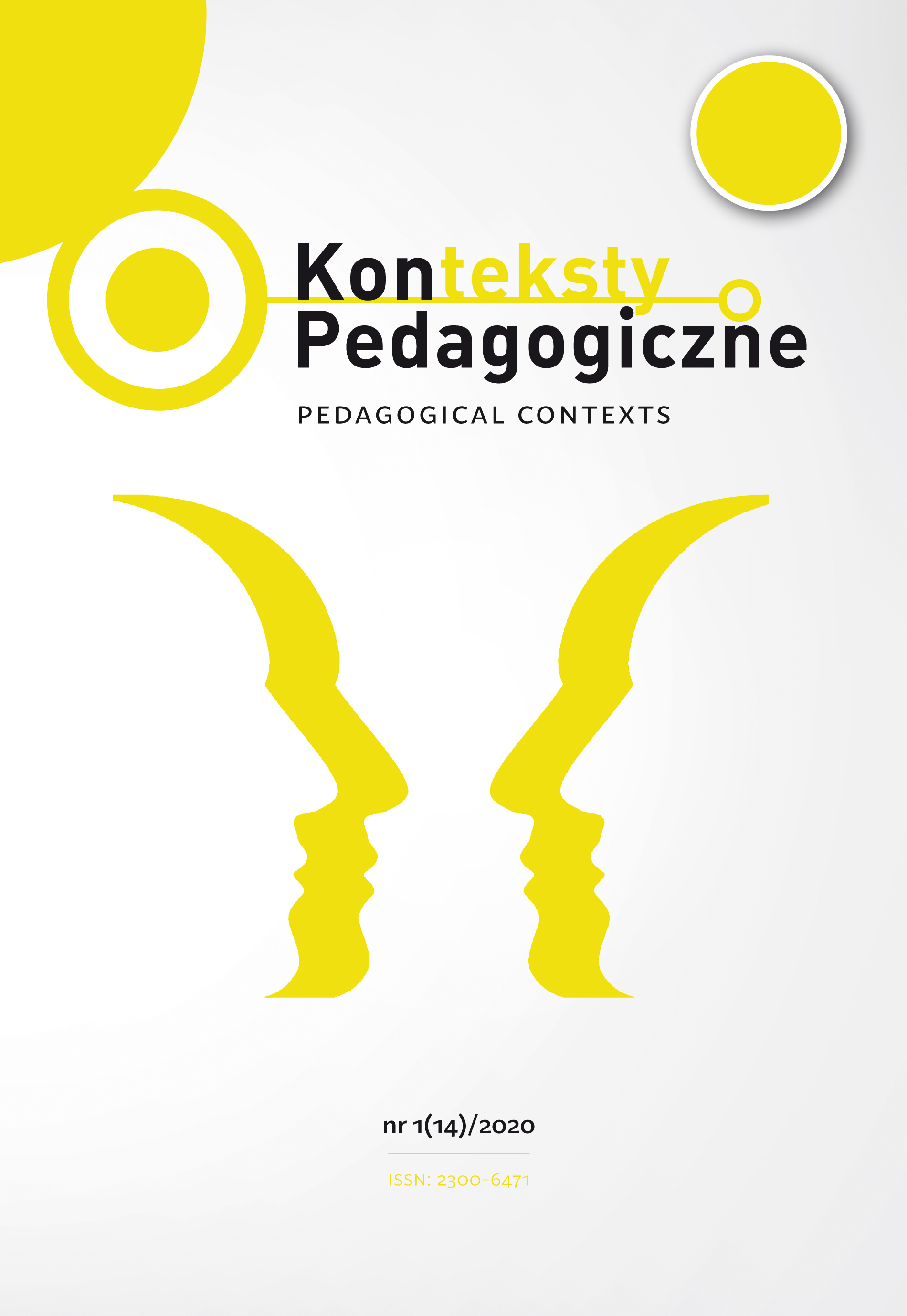Abstract
Child-teacher communication in educational situations is a special form of communication based on the dyadic structure and the relationships of the participants. Its specificity is expressed in various types of statements demonstrating the dyadism of the educational situation and the asymmetry of the relationship. These statements include ones accepting the child’s independence, expressing readiness to help, confirming the child’s dependence, confirming the teacher’s independence and ones of the children expressing themselves. Their occurrence determines the quality of education. Recognition and creation of an appropriate relationship with the student by building a proper relationship with them is a necessary skill of the teacher.
References
Adamek, I. (2014). Jakość edukacji dziecka/ucznia – nauczyciele jako przewodnicy w uczeniu się [Quality of Child/Student Education – Teachers as Learning Guides]. In: I. Adamek & B. Olszewska (eds.), Pomiędzy dwoma edukacjami. Nauczyciel wczes-nej edukacji dziecka wobec zmian [Between Two Educations. Early School Education Teacher in the Face of Change] (pp. 15–26). Łódź: Wydawnictwo Naukowe Wyższej Szkoły Pedagogicznej w Łodzi.
Bochno, E. (2004). Rozmowa jako metoda oddziaływania wychowawczego [Conversation as a Method of Educational Influence]. Kraków: Oficyna Wydawnicza Impuls.
Eggins, S. & Martin, J.R. (2001). Gatunki i rejestry dyskursu [Genres and Registers of Discourse]. In: T.A. Van Dijk (ed.), Dyskurs jako struktura i proces [Discourse as Structure and Process], transl. T. Dobrzyńska & G. Grochowski (pp. 153–182). Warszawa: Wydawnictwo Naukowe PWN.
Flick, U. (2012). Projektowanie badania jakościowego [Designing Qualitative Research], transl. P. Tomanek. Warszawa: Wydawnictwo Naukowe PWN.
Frydrychowicz, S. (2005). Sposoby i wymiary komunikowania interpersonalnego a rozwój człowieka [Ways and Dimensions of Interpersonal Communication and Human Development]. Psychologia Rozwojowa, 10(3), 93–100.
Gibbs, G. (2015). Analizowanie danych jakościowych [Analyzing Qualitative Data]. Warszawa: Wydawnictwo Naukowe PWN.
Harwas-Napierała, B. (2006). Komunikacja interpersonalna w rodzinie [Interpersonal Family Communication]. Poznań: Wydawnictwo Naukowe Uniwersytetu im. Adama Mickiewicza.
Kojs, W. (2014). O strukturze i funkcjach rozmowy w procesach kształcenia [On the Structure and Functions of Conversation in Educational Processes]. In: A. Karpińska & N. Zinczuk (eds.), Dydaktyczna refleksja o edukacyjnych priorytetach [Didactic Reflection on Educational Priorities] (pp. 179–200). Warszawa: Żak.
Miles, M.B. & Huberman, A.M. (2000). Analiza danych jakościowych [Qualitative Data Analysis], transl. S. Zabielski. Białystok: Trans Humana.
Nęcki, Z. (2000). Komunikacja międzyludzka [Interpersonal Communication]. Kraków– Kluczbork: Antykwa.
Oelszlaeger-Kosturek, B. (2018). Nauczyciel i uczeń. Teoria i praktyka odbioru oraz transmisji informacji w edukacji wczesnoszkolnej [Teacher and Student. Theory and Practice of Receiving and Transmitting Information in Early School Education]. Katowice: Wydawnictwo Uniwersytetu Śląskiego.
Ostrowska, U. (2000). Dialog w pedagogicznym badaniu jakościowym [Dialogue in a Qualitative Pedagogical Study]. Kraków: Oficyna Wydawnicza Impuls.
Retter, H. (2005). Komunikacja codzienna w pedagogice [Everyday Communication in Pedagogy]. Gdańsk: Gdańskie Wydawnictwo Psychologiczne.
Rostańska, E. (2010). Dziecko i dorosły w rozmowie [A Child and an Adult in Conversation]. Katowice: Wydawnictwo Uniwersytetu Śląskiego.
Rostańska, E. (2016). Komunikacyjne relacje między dzieckiem i nauczycielem edukacji wczesnoszkolnej [Communication Relations Between a Child and an Early School Education Teacher]. In: K. Kraszewski & I. Paśko (eds.), Aktywność poznawcza i działaniowa dzieci w badaniach pedagogicznych [Cognitive and Operational Activity of Children in Pedagogical Research] (pp. 37–44). Kraków: Wydawnictwo Naukowe Uniwersytetu Jagiellońskiego.
Rostańska, E. (2018). Trudna komunikacja – trudna edukacja [Difficult Communication – Difficult Education]. Konteksty Pedagogiczne, 1(10), 37–48.
Rostańska, E. (2019). Trudna komunikacja. Porozumiewanie się dziecka i dorosłego w rodzinie i szkole [Difficult Communication. Child-Adult Communication in Family and School]. In: M. Cywińska (ed.), Edukacyjne przestrzenie sytuacji trudnych dzieci [Educational Situational Spaces of Difficult Children] (pp. 349–369). Poznań: Wydawnictwo Naukowe Uniwersytetu im. Adama Mickiewicza.
Rubacha, K. (2008). Metodologia badań nad edukacją [Methodology of Educational Research]. Warszawa: Wydawnictwa Akademickie i Profesjonalne.
Van Dijk, T.A. (2001). Badania nad dyskursem [Discourse Analysis]. In: T.A. Van Dijk (ed.), Dyskurs jako struktura i proces [Discourse as Structure and Process], transl. T. Dobrzyńska & G. Grochowski (pp. 9–45). Warszawa: Wydawnictwo Naukowe PWN.
Zalewska-Bujak, M. (2017). Obraz szkolnych relacji komunikacyjnych nauczyciela z uczniami [An Image of Teacher-Student Communication Relations]. Konteksty Pedagogiczne, 2(9), 59–76.
In accordance with the recommendation of the Ministry of Science and Higher Education, which aims to counteract the practice of “ghostwriting” and “guest authorship,” all authors submitting their text for publication should attach an author’s statement which declares the contribution of each of the authors to the article. The printed and signed statement should be delivered by mail or other means to editor-in-chief Joanna Skibska or sent in the form of a scan to the following e-mail address: redakcja@kontekstypedagogczne.pl. The authors will not receive remuneration for publishing their papers. The editors reserve the right to make minor editorial changes to the articles which will not affect the substance of the article. We encourage all authors to prepare their articles in accordance with the guidelines for manuscript preparation. Download pdf file.
Authors transfer all copyrights and grant the journal the right of first publication with the work simultaneously licensed under a Creative Commons Attribution License that allows others to share the work with acknowledgement of the work's authorship and initial publication in this journal. All authors agree to the publishing of their email addresses, affiliations and short bio statements with their articles during the submission process.

